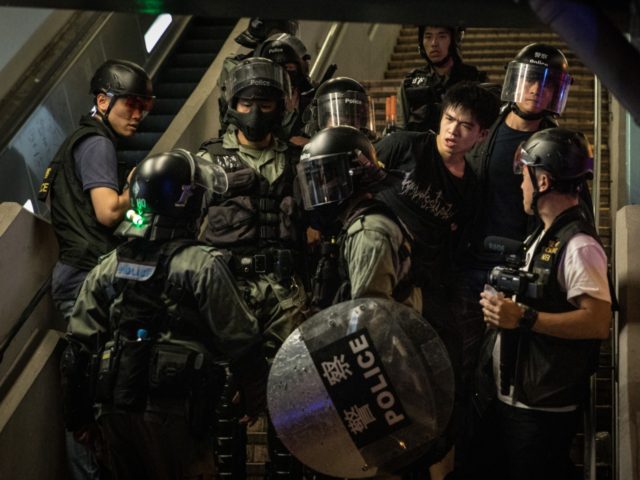Hong Kong’s weekend of protests included a peaceful rally in which thousands of demonstrators marched to the U.S. consulate, sang the “Star-Spangled Banner,” and pleaded for help from President Donald Trump. Numerous other demonstrations around the city became violent clashes between protesters and police.
The weekend’s activities sent a clear signal that Hong Kong chief executive Carrie Lam’s belated decision to permanently withdraw the controversial extradition bill that touched off the protests would not put an end to the movement.
Thousands of people gathered outside the U.S. consulate, waving American flags and holding signs that read “Fight for freedom, stand with Hong Kong” and “Resist Beijing, liberate Hong Kong.”
Some of the placards and banners displayed at the rally appealed directly to the U.S. president, with slogans like “President Trump, please save Hong Kong” and “Make Hong Kong great again.”
The protesters want the United States to pass a bill that would impose sanctions against officials in Hong Kong and China who take steps to oppress democracy or violate human rights, possibly culminating in the revocation of Hong Kong’s special trade status. The Trump administration has been reluctant to directly intervene in the Hong Kong showdown, beyond urging Beijing to show restraint. The Chinese Communist Party routinely portrays the protest movement as a U.S. effort to undermine Chinese sovereignty.
“We are here to urge the U.S. government to pass the Hong Kong Human Rights and Democracy Act. We are not selling out Hong Kong but defending the Basic Law, which promises us democracy and human rights,” one student demonstrator told the South China Morning Post.
“If there’s one country that can restrain the Chinese Communist Party, it will be the U.S.,” an elderly demonstrator said.
Lam’s administration refuted the protesters on Monday by insisting “a foreign legislature should not interfere in any form in the internal affairs” of Hong Kong.
The government further condemned the “illegal behavior of the radical protesters” and said, “their vandalizing acts deprive the rights of other members of the public to use the MTR and must be stopped immediately.”
This was a reference to demonstrations at several of the city’s railroad stations. As many observers have noted, the Hong Kong protests are falling into a pattern of huge peaceful rallies during the day followed by vandalism and violent confrontations with police at night. Demonstrators forced some stations to close on both Saturday and Sunday evening, with numerous injuries reported after riot police moved in, firing tear gas and beanbag rounds. Commuters were obliged to use much slower ferry services to get around the blockaded MTR stations.
In some instances, the police said they were responding to fires set by demonstrators, acts of vandalism they perpetrated, and their habit of shining laser beams around areas they have blockaded.
Riot police also reportedly appeared at some MTR stations where their presence did not seem to be necessary, prompting an angry response from local residents. Some reporters covering the protests said the police fired tear gas and pepper spray at them.
The police reported arresting a total of 157 people between Friday and Monday. City officials touring the damaged MTR stations asked protesters to show more respect for the rail system, which one of them called “the pride of Hong Kong, which we should treasure.” One of those officials was Carrie Lam herself, making a rare public appearance to draw attention to the damage inflicted upon the railway system.
Some of the facilities are said to be so badly damaged that they cannot be used again without extensive repairs and the replacement of expensive electronic systems. MTR officials said on Monday that over 40 percent of the city’s 91 stations have been damaged and several of them might be closed indefinitely if they are vandalized again.
On Monday, hundreds of uniformed school students formed human chains across Hong Kong to show their support for the protest movement. In addition to calling upon the city government to grant the other demands of the movement now that the extradition bill has been withdrawn, the students chanted “Hong Kong people, add oil,” a popular protest slogan that sounds odd when translated to English but essentially means “don’t back down” or “step on the gas.”

COMMENTS
Please let us know if you're having issues with commenting.